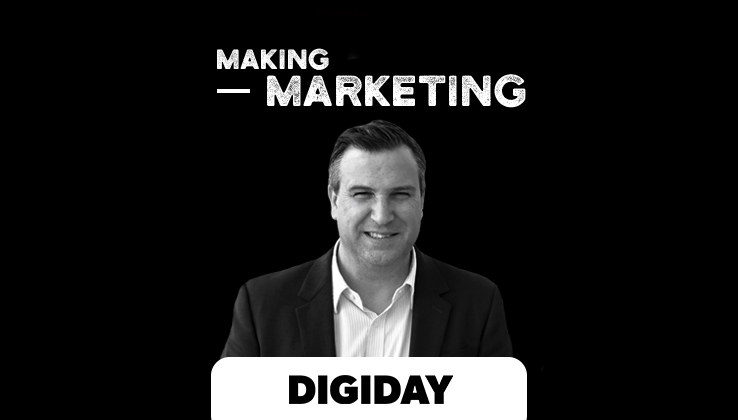Nestle’s Pete Blackshaw: It’s challenging for a company our size to pivot

Subscribe: iTunes | Google Play | Stitcher | RSS | Anchor
There’s a lot of talk around “nimbleness” inside big companies. But the legacy internal red tape stands in the way of operations and the lessons of traditional marketing behavior are difficult to unlearn.
That’s been the responsibility of Pete Blackshaw, Nestlé’s Global Head of Digital Innovation Service & Service Models, who has spent the last few years working on changing up the company’s internal makeup so it can move faster.
“It’s challenging for any large company of our size to pivot,” Blackshaw said in the latest episode of Making Marketing. “There are islands of momentum, like Nespresso where a significant percentage of business is direct to consumer or through boutiques. It’s given us a lot of experience and know-how. We’ve been leading a lot of different initiatives. It requires a different mindset of speed, mastery of data, appreciation of personalization and an understanding of marriage between programmatic media and first-party data. Those things also matter with traditional digital marketing but especially important in the DTC world.”
Blackshaw sat down with Shareen Pathak to discuss the ease and difficulty of being a direct-to-consumer brand, his upcoming new job at Cintrifuse and more. Edited highlights below:
DTC brands are strong competition because of customer reviews.
“You can go to market with DTC if you have a compelling value proposition and if you can work the data side. It’s not cheap but certainly, it’s at a significantly lower entry cost than a few years ago, when we would start a business from scratch. They start with Amazon, Alibaba and directly through these channels instead of working through offline channels. They’re brilliant with getting reviews and getting traction. It requires different skills sets. They do customer service extremely well in an e-commerce context. The advocacy gets you reviews that create viral effects, it indexes in Google search results and you’re in a good position. Engagement is also extremely important for winning today. They can use that to seduce retailers to give them offline distribution. You never saw this kind of speed before in the traditional market rollout strategy. Great service is not free. Your cost to service is higher in a DTC environment but it pays out in very compelling ways. We’ve been humbled by the small market share companies who get more reviews online. Those brands are good at thinking about experience. They have a tie to purpose and sustainability that ignites the passion of millennials.”
Brands need to rethink customer service.
“Brands have to expand their value proposition. They have to think about service layers that sit on top of the core product. They have to differentiate themselves. The trend towards private label is going to continue to grow. The competitive differentiator beyond product performance may be that service layer. I’ve been spending a lot of time on how to marry up voice activation to recipes, wearables to a brand that is closely linked to athletics and getting smart about bots. Brands need to act like a concierge. Is the brand prepared to provide that? This might be the real differentiator. It requires a renaissance in brand thinking. We may have to think about mashing up marketing and sales or the likes. It’s important to discuss how marketing and sales come together and the tension between performance and branding, especially when we’re trying to maximize user experience. Over time, marketers will figure it out but it will be a bit ambiguous in the coming years.”
The opportunity at Cintrifuse.
“It’s a tremendous opportunity to help a region and a number of leading companies to enter the future. It’s a unique circumstance where big companies, like Proctor and Gamble, Kroger and others, have come together to say they want to be the biggest startup hub in the midwest. We need to attract VC money, entrepreneurs, we need to figure out pillars and strategies so people can [see] we can do it. I can work with entrepreneurs and also work with larger companies that are trying to figure out how to compete in the world of small companies gabbing [market] shares from them. It’s also about reinventing business processes.”
More in Marketing

Star power, AI jabs and Free Bird: Digiday’s guide to what was in and out at the Super Bowl
This year’s Big Game saw established brands lean heavily on star power, patriotic iconography and the occasional needle drop.

In Q1, marketers pivot to spending backed by AI and measurement
Q1 budget shifts reflect marketers’ growing focus on data, AI, measurement and where branding actually pays off.

GLP-1 draws pharma advertisers to double down on the Super Bowl
Could this be the last year Novo Nordisk, Boehringer Ingelheim, Hims & Hers, Novartis, Ro, and Lilly all run spots during the Big Game?








